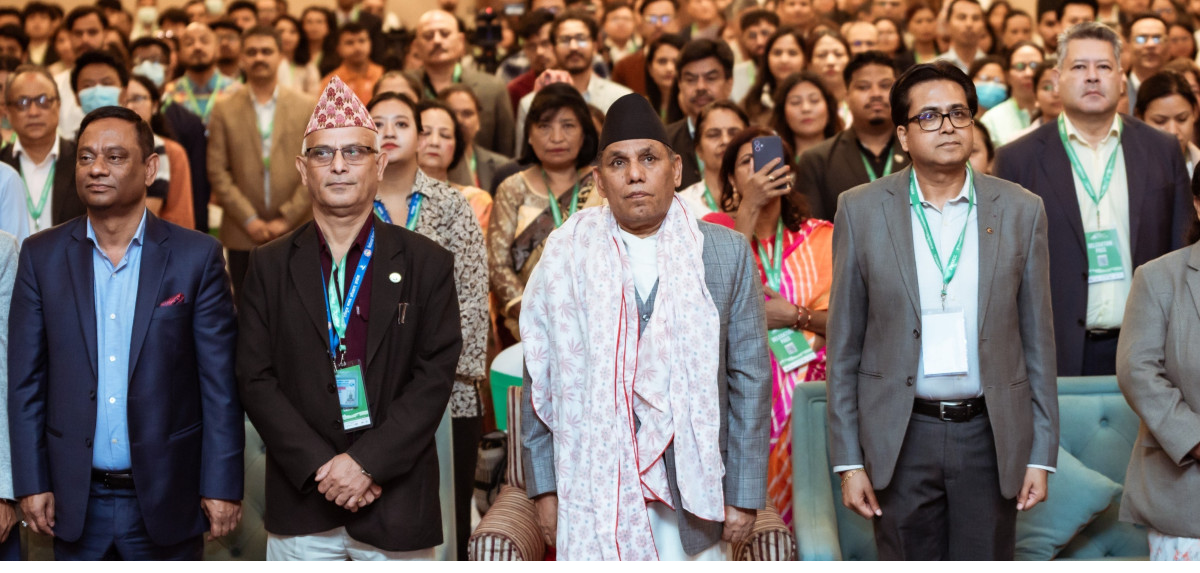 नागरिक पोष्ट
नागरिक पोष्ट
बिहीबार, ३१ जेष्ठ २०८१
13329 views
13329 views

Kathmandu, 12th June : Nepal hosted its first-ever Waste Management & Climate Conference (WMCC) at Hotel Soaltee on the occasion of World Environment Day. The event was organized by the Confederation of Nepalese Industries (CNI), The Coca-Cola Foundation, National Human Rights Commission (NHRC), Khaalisisi, Women for Human Rights (WHR), and CNIYEF, uniting key stakeholders to address Nepal’s waste management and climate challenges.
The WMCC brought together government officials, industry leaders, environmental experts, and community advocates to tackle critical issues related to waste management, climate change, and environmental sustainability.
The opening ceremony, graced by Chief Guest Rt. Hon’ble National Assembly Chairman Narayan Dahal, showcased the conference's commitment to sustainability with a tree-planting ceremony. It featured opening remarks, a keynote speech, the unveiling of the Material Recovery Facility (MRF), and the launch of the book “ABC for Climate”. At the closing, Hon’ble Nawal Kishor Sah Sudi, Minister of Environment and Forest, discussed his ministry's climate action initiatives.
"The WMCC is a milestone event for Nepal," said Carlos Pagoaga, President of The Coca-Cola Foundation. "It reflects our shared commitment to creating sustainable solutions for the environmental challenges we face."
A key component of the conference was the Mayor's Forum, which facilitated dialogue between local government officials and industry leaders on effective municipal waste management strategies. Mayors from Lalitpur, Dhangadi, Dhankuta, Budhanilkantha, and the deputy-mayor from Chandragiri participated, with the session moderated by Dil Bhusan Pathak, host of TOUGH Talk.
The conference explored innovative solutions to turn waste into useful resources, promoting a circular economy. It discussed issues like carbon emissions, plastic pollution, air pollution in Kathmandu, and the effects of climate change on the Himalayas, including Mount Everest. Presentations highlighted innovative waste management ideas from GIZ and Nepal's commitments to the Paris Agreement.
“This conference is a significant step towards empowering communities, especially women, to take part in climate action,” said Kabita Pandey, President of Women for Human Rights (WHR). “Together, we can drive meaningful change.”
Remarks by Hon'ble House of Representatives Sobita Gautam, Toshima Karki, and Uday Rana emphasized the crucial need for collaborative efforts in tackling environmental challenges. Their insights highlighted the power of united action in fostering sustainable solutions.
Nearly 1,000 delegates from 600 organizations across 33 districts and 5 countries attended the event, highlighting the widespread interest and commitment to advancing waste management and climate action in Nepal.
The WMCC served as a national platform, uniting government officials, parliamentarians, diplomats, and industry experts. It fostered collaboration and policy dialogue to advance Nepal's waste management and climate agenda, driving tangible outcomes for a cleaner, more sustainable future.
The event concluded with concrete commitments from various stakeholders, setting a clear roadmap for future actions. The collaboration and innovative ideas presented have laid the groundwork for significant improvements in waste management and environmental policies, ensuring a lasting impact on Nepal’s sustainability efforts.
About The Coca-Cola Foundation
The Coca-Cola Foundation’s mission is to make a difference in communities around the world where The Coca-Cola Company operates and where our employees live and work. We support transformative ideas and institutions that address complex global challenges and that leave a measurable and lasting impact. Our giving is focused on sustainable access to safe water, climate resilience and disaster risk preparedness and response, circular economy, economic empowerment, and causes impacting our hometown community. Since its inception in 1984, The Coca-Cola Foundation has awarded grants of over $1.5 billion in service of its mandate to strengthen communities across the world.